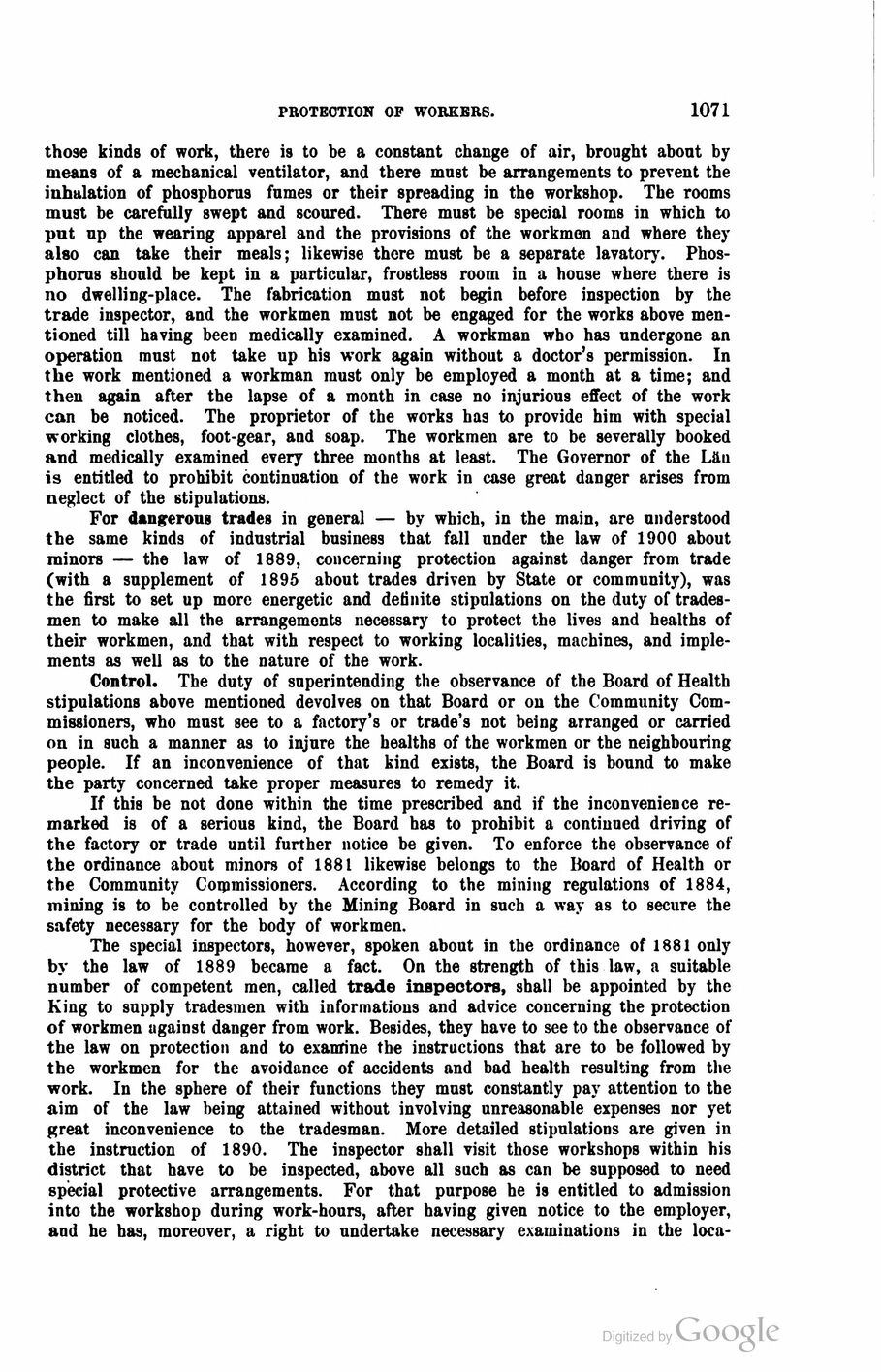
Full resolution (JPEG) - On this page / på denna sida - Second part - XVI. Labour Legislation and Social Statistics - 1. Labour Legislation. By A. Raphael, Ph. D., D. C. L., Stockholm - Protection of Workers

<< prev. page << föreg. sida << >> nästa sida >> next page >>
Below is the raw OCR text
from the above scanned image.
Do you see an error? Proofread the page now!
Här nedan syns maskintolkade texten från faksimilbilden ovan.
Ser du något fel? Korrekturläs sidan nu!
This page has never been proofread. / Denna sida har aldrig korrekturlästs.
protection of workers.
1071
those kinds of work, there is to be a constant change of air, brought about by
means of a mechanical ventilator, and there must be arrangements to prevent the
inhalation of phosphorus fumes or their spreading in the workshop. The rooms
must be carefully swept and scoured. There must be special rooms in which to
put up the wearing apparel and the provisions of the workmen and where they
also can take their meals; likewise there must be a separate lavatory.
Phosphorus should be kept in a particular, frostless room in a house where there is
no dwelling-place. The fabrication must not begin before inspection by the
trade inspector, and the workmen must not be engaged for the works above
mentioned till having been medically examined. A workman who has undergone an
operation must not take up his work again without a doctor’s permission. In
the work mentioned a workman must only be employed a month at a time; and
then again after the lapse of a month in case no injurious effect of the work
can be noticed. The proprietor of the works has to provide him with special
working clothes, foot-gear, and soap. The workmen are to be severally booked
and medically examined every three months at least. The Governor of the Läu
is entitled to prohibit continuation of the work in case great danger arises from
neglect of the stipulations.
For dangerous trades in general — by which, in the main, are understood
the same kinds of industrial business that fall under the law of 1900 about
minors — the law of 1889, concerning protection against danger from trade
(with a supplement of 1895 about trades driven by State or community), was
the first to set up more energetic and definite stipulations on the duty of
tradesmen to make all the arrangements necessary to protect the lives and healths of
their workmen, and that with respect to working localities, machines, and
implements as well as to the nature of the work.
Control. The duty of superintending the observance of the Board of Health
stipulations above mentioned devolves on that Board or on the Community
Commissioners, who must see to a factory’s or trade’s not being arranged or carried
on in such a manner as to injure the healths of the workmen or the neighbouring
people. If an inconvenience of that kind exists, the Board is bound to make
the party concerned take proper measures to remedy it.
If this be not done within the time prescribed and if the inconvenience
remarked is of a serious kind, the Board has to prohibit a continued driving of
the factory or trade until further notice be given. To enforce the observance of
the ordinance about minors of 1881 likewise belongs to the Board of Health or
the Community Commissioners. According to the mining regulations of 1884,
mining is to be controlled by the Mining Board in such a way as to secure the
safety necessary for the body of workmen.
The special inspectors, however, spoken about in the ordinance of 1881 only
by the law of 1889 became a fact. On the strength of this law, a suitable
number of competent men, called trade inspectors, shall be appointed by the
King to supply tradesmen with informations and advice concerning the protection
of workmen against danger from work. Besides, they have to see to the observance of
the law on protection and to examine the instructions that are to be followed by
the workmen for the avoidance of accidents and bad health resulting from the
work. In the sphere of their functions they must constantly pay attention to the
aim of the law being attained without involving unreasonable expenses nor yet
great inconvenience to the tradesman. More detailed stipulations are given in
the instruction of 1890. The inspector shall visit those workshops within his
district that have to be inspected, above all such as can be supposed to need
special protective arrangements. For that purpose he is entitled to admission
into the workshop during work-hours, after having given notice to the employer,
and he has, moreover, a right to undertake necessary examinations in the loca-
<< prev. page << föreg. sida << >> nästa sida >> next page >>